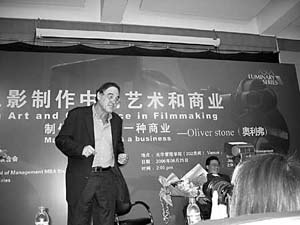| Tools: Save | Print | E-mail | Most Read |
| Filmmaker Gets down to Business with Managers |
| Adjust font size: |
When class began on Sunday at the "For a business school, efficiency is very important," said the man at the front of the class who lectured about economics. It was a subject covered over and over again at the business school. But the speaker was no professor enlightening students on the intricacies of supply and demand and he wasn't an economist, either. The guest lecturer was the renowned film director Oliver Stone. Stone brought his expertise on economics to students the economics of filmmaking, that is. He showed students how to maximize profits by managing the funds in big-budget movies. "Making a movie is a business, and balancing art and commerce in filmmaking is the key to success," said Stone, who won Oscars for the best director for Born on the Fourth of July (1989) and Platoon (1986) and whose blockbusters such as Alexander and Looking for Fidel were widely received worldwide in recent years. "First of all, developing the script is like developing a business plan," Stone said.
Famous film director Oliver Stone speaks to Peking University business students about the economics of filmmaking.
Scripts depend on ideas and finding a unique angle is the most difficult part. Building a team composed of actors, writers and producers is just like building a business team, he said. To improve the film, he hires a number of writers dedicated to one film, just like drafting a business plan. This way, many people can contribute varying ideas and brainstorm for the best outcome. Then comes the hard part in making a film, the same as for a business project financing. Innovation in hunting for financing is crucial, said Stone. When he directed JKF in 1989, he considered it the most successful one in terms of profit, as filming lasted 13 weeks and cost US$15 million to make. "However nowadays, one of my recent enormous works also lasted for 13 weeks, but cost me US$90 million," he said. Stone also stressed the importance of saving both money and time. While shooting Alexander, the main actor broke his leg. He couldn't wait for three months, so Stone encouraged him to stay on, until the filming was complete. Risk management, a hot topic in business school, is also something Stone is aware of. He raised several points as important, including temperament, speed, transportation and safety and the animals he has to work with. Stone said the fact that DVDs are challenging movies in cinema is tough on filmmakers. However, it also gives new life cycle of movie products, he said. He also encouraged that filmmakers should strive to make profits from TV, pay-per-view, cable and the Internet to expand profit-earning channels. Soo Ming Jie, an EMBA student at the The Asia Luminary Series plans to introduce more celebrities to the school, to share their life and business insights and success, Soo said. ( |
| Tools: Save | Print | E-mail | Most Read |
 |
| Related Stories |
|
Product Directory China Search |
Country Search Hot Buys |
